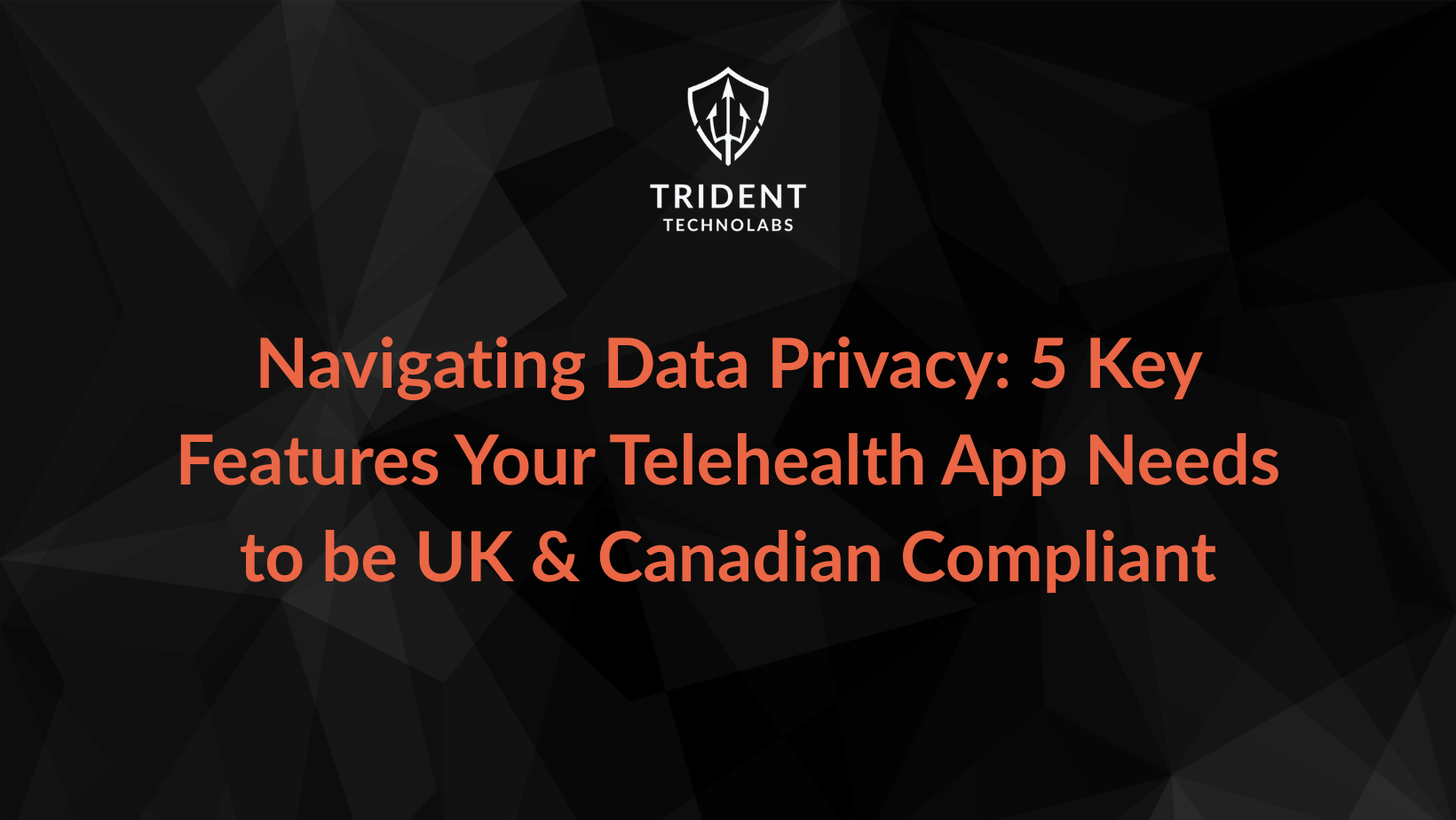Navigating Data Privacy: 5 Key Features Your Telehealth App Needs to be UK & Canadian Compliant

October 1, 2025
Navigating Data Privacy: 5 Key Features Your Telehealth App Needs to be UK & Canadian Compliant
Telehealth has become one of the most transformative innovations in modern healthcare. With patients increasingly relying on apps for consultations, prescriptions, and health records, data privacy in telehealth apps is now a top concern. Both the UK GDPR (alongside the Data Protection Act 2018) and Canada’s PIPEDA and PHIPA outline strict rules for how patient information must be handled.
If you’re building or scaling a telehealth app for these markets, telehealth app compliance in the UK and Canada isn’t just a regulatory necessity—it’s also the foundation for patient trust. Below, we’ll explore the five key features your telehealth app needs to ensure compliance while delivering a secure and seamless healthcare experience.
1. End-to-End Encryption of Patient Data
Encryption is the backbone of telehealth data security best practices. Regulations in both the UK and Canada demand that all personal health information (PHI) is protected against unauthorized access.
Why it matters: UK GDPR and PHIPA require strong measures to prevent data interception and leaks.
Implementation: Ensure your telehealth app uses end-to-end encryption in telehealth apps with protocols like TLS 1.3 for data in transit and AES-256 for data at rest. This ensures sensitive medical conversations and records remain confidential.
Keywords targeted: end-to-end encryption in telehealth apps, telehealth data security best practices
2. Robust Patient Consent Management
One of the most critical aspects of telehealth compliance in Canada and the UK is consent. Both UK GDPR telehealth compliance and PIPEDA telehealth compliance emphasize that patients must fully understand how their data will be collected, stored, and used.
Why it matters: PIPEDA requires meaningful consent, while UK GDPR insists on explicit consent before processing sensitive health data.
Implementation: Build clear, simple consent workflows inside your app. Provide patients with options to grant, withdraw, or modify consent anytime. Avoid jargon—keep your policies transparent and patient-friendly.
Keywords targeted: telehealth consent management Canada, UK GDPR telehealth compliance, PIPEDA telehealth compliance
3. Role-Based Access Controls (RBAC)
Not every healthcare professional needs unrestricted access to patient data. This is where role-based access control for healthcare apps comes in.
Why it matters: PHIPA in Ontario specifically requires limiting access to PHI only to those who need it. Similarly, GDPR emphasizes minimizing data exposure.
Implementation: Introduce RBAC with multi-factor authentication (MFA) so doctors, nurses, and administrative staff only see what’s relevant to their role. This prevents insider threats and ensures secure healthcare software in UK and Canada markets.
Keywords targeted: role-based access control healthcare, PHIPA telehealth compliance, secure healthcare software UK and Canada
4. Data Residency & Storage Compliance
Data residency laws are another major pillar of telehealth app compliance in the UK and Canada. Both regions regulate where patient data can be stored.
Why it matters: PHIPA often mandates that patient data is stored on servers within Canada, while post-Brexit, the UK enforces its own GDPR rules for healthcare app data residency.
Implementation: Host PHI on local or region-specific cloud servers. For example, use UK data centers for British patients and Canadian data centers for Canadian patients. Global providers like AWS, Azure, and Google Cloud all offer region-specific hosting options to support cloud hosting for healthcare data in Canada and the UK.
Keywords targeted: healthcare app data residency UK, cloud hosting for healthcare data Canada, telehealth app compliance UK
5. Comprehensive Audit Trails & Breach Response Protocols
Even with the strongest protections, breaches can occur. Both GDPR and Canadian regulations require audit trails for healthcare applications and a robust incident response plan.
Why it matters: UK GDPR requires organizations to report data breaches within 72 hours. Under Canadian law, organizations must notify individuals affected “as soon as feasible.”
Implementation: Set up real-time monitoring, audit trails, and automated alerts for unusual activity. Document every access attempt and create a formal breach response protocol to ensure compliance with both telehealth app compliance in Canada and UK GDPR standards.
Keywords targeted: audit trails for healthcare applications, telehealth app compliance Canada, telehealth data security best practices
Final Thoughts
Telehealth app compliance in the UK and Canada is about more than meeting minimum legal requirements—it’s about creating a secure, transparent, and trusted healthcare ecosystem. By building features like end-to-end encryption, consent management, RBAC, compliant data residency, and audit trails, you not only align with UK GDPR, PIPEDA, and PHIPA but also position your telehealth platform as a trusted partner for both patients and providers.
👉 At Trident Technolabs, we specialize in telehealth app development for compliance. If you’re ready to build secure healthcare software for UK and Canadian markets, let’s talk about how we can bring your vision to life—while keeping patient privacy at the core.
Ready to Build a Smarter Clinic?
Whether you're a private practitioner or a hospital network, investing in a custom healthcare app can be a game-changer.
Contact Us Today